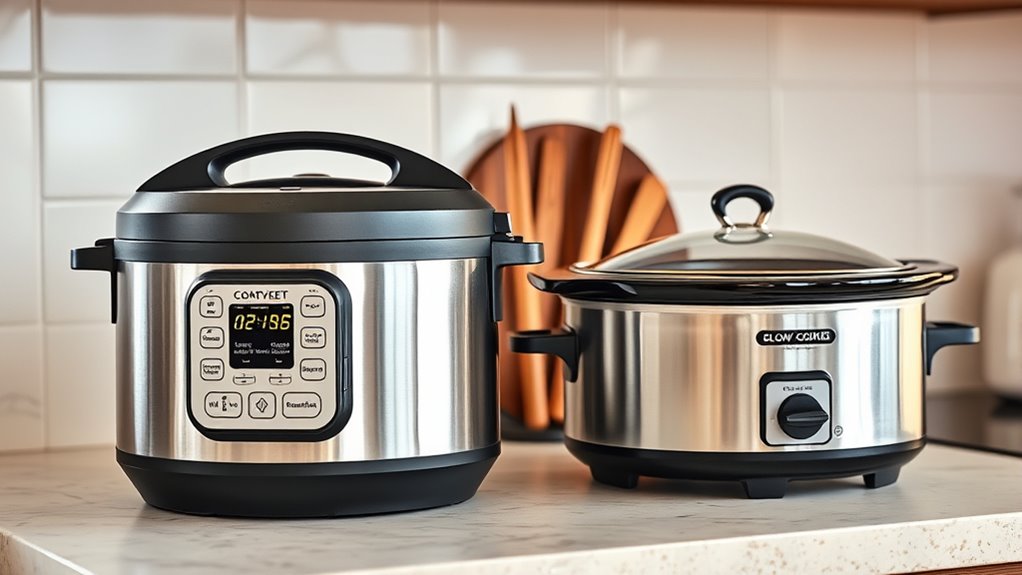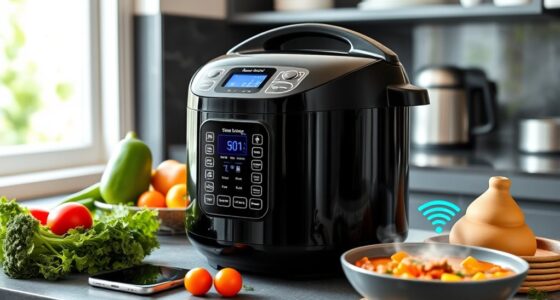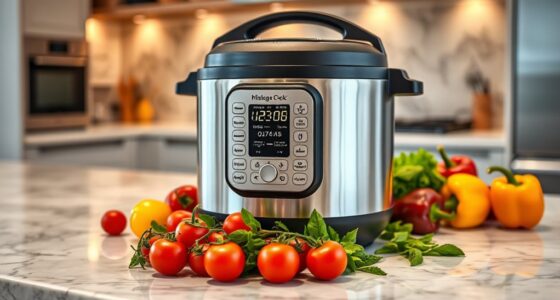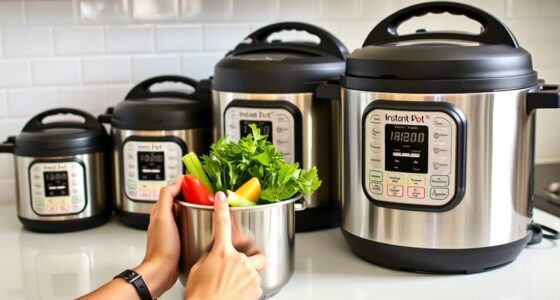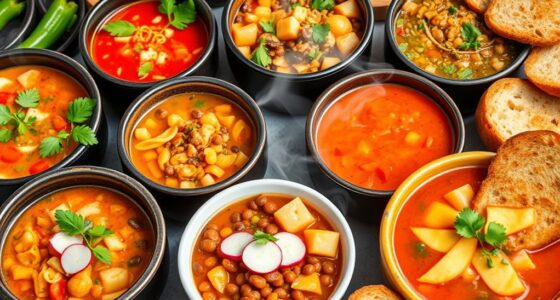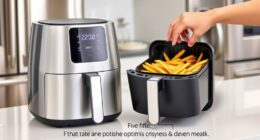If you’re looking to save kitchen space, a slow cooker is the better option because of its simple, compact design that fits easily on countertops or in cabinets. Multicookers, though larger initially, have become more space-efficient thanks to modern advancements and smaller models. If space is your main concern, a slow cooker offers a straightforward, minimal footprint. To discover the full benefits and differences, keep exploring further details below.
Key Takeaways
- Slow cookers are generally more compact and easier to store than multicookers.
- Multicookers tend to be larger due to multiple functions and accessories, requiring more storage space.
- Advances have made some multicookers more space-efficient, narrowing the size gap.
- For limited kitchen space, slow cookers are typically the better choice for saving room.
- Overall, slow cookers usually take up less space than multifunctional multicookers.
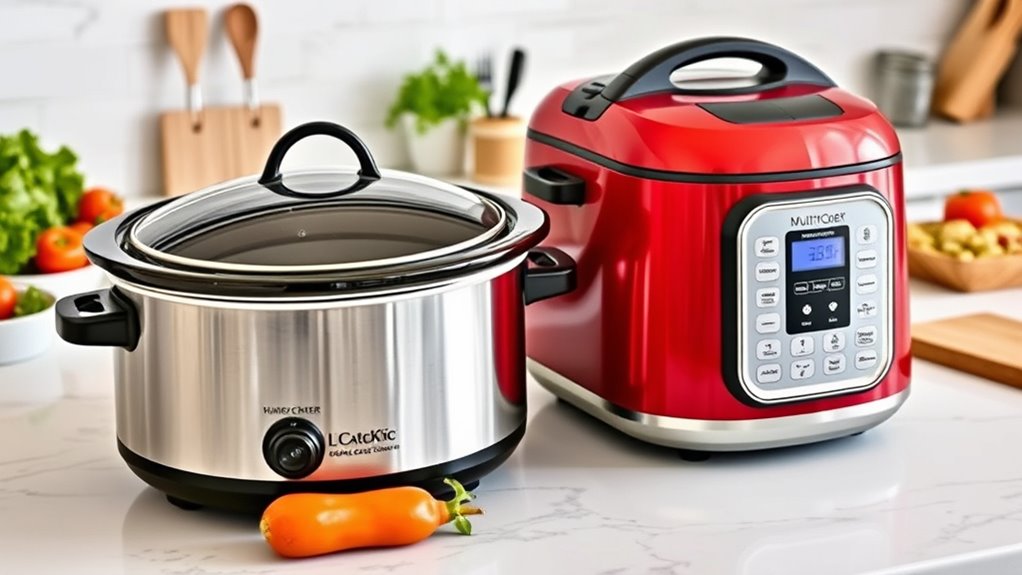
When choosing between a slow cooker and a multicooker, understanding their differences can help you decide which appliance best suits your cooking style. Both are designed to simplify meal prep, but they offer distinct advantages, especially when it comes to space and functionality. A slow cooker is straightforward, primarily used for simmering dishes over several hours. It’s compact, often fitting easily on your countertop, and offers excellent energy efficiency for long, low-temperature cooking. If your goal is to prepare hearty stews or roasts with minimal fuss, a slow cooker can be a space-saving, energy-conscious choice that doesn’t clutter your kitchen.
A slow cooker is a compact, energy-efficient appliance ideal for simmering hearty meals with minimal fuss.
On the other hand, a multicooker packs a lot more cooking versatility into a single appliance, combining functions like pressure cooking, steaming, sautéing, and even baking. While this versatility means you can replace several appliances with one device, it also means multicookers tend to be bulkier. Their multiple functions often require additional accessories or inserts, which can take up more storage space. If your kitchen is tight on space, this could be a drawback, even though you’re gaining a multifunctional tool. Still, if you frequently experiment with different recipes or want the convenience of multiple cooking modes in one device, a multicooker can justify its larger footprint.
Energy efficiency is another factor to ponder. Slow cookers use low, steady heat over extended periods, which generally means lower energy consumption compared to other cooking methods. They’re ideal for saving on electricity, especially if you prepare meals that cook for several hours. Multicookers, especially pressure cooking modes, can also be energy-efficient because they reduce cooking time significantly. However, their multiple functions and electronic components might consume more power when used at full capacity. If energy savings are a priority, a slow cooker’s simple design and consistent low heat can be more cost-effective in the long run.
In terms of space, a slow cooker’s simplicity makes it easier to store and minimizes clutter on your countertop. It’s a dedicated device with minimal features, so it doesn’t take up much room and can often be tucked away in a cabinet when not in use. A multicooker, while offering more cooking options, demands more storage space due to its size and accessories. If you’re limited on space but still want some variety in your cooking, a slow cooker’s straightforward design might be the better choice. Conversely, if you prefer an all-in-one appliance and have the room to accommodate it, a multicooker provides unmatched versatility without requiring multiple devices. Additionally, advancements in home appliance technology have led to more compact multicooker models, making their space requirements more manageable than before.
Frequently Asked Questions
Can a Multicooker Replace All Kitchen Appliances?
In the multi functionality debate, you might wonder if a multicooker can replace all your kitchen appliances. While it offers impressive appliance replacement potential, it might not handle everything perfectly—like toasting or baking certain items. You can save space by choosing a versatile device, but you’ll still need specialized appliances for specific tasks. Overall, a multicooker can reduce clutter, but it might not fully replace every single kitchen gadget.
Which Device Has Better Energy Efficiency?
Imagine your kitchen humming softly, a device efficiently using energy to cook your favorite meal. When comparing energy consumption, multicookers often have better power savings because they combine functions into one unit, reducing standby power. They’re designed to use less energy overall, making them more energy-efficient than traditional slow cookers. So, if you want to save on energy bills while cooking, a multicooker’s your best bet.
Are There Safety Concerns With Multicookers?
You might wonder if multicookers pose safety concerns. Rest assured, they come with safety features like lid locks, automatic shut-off, and pressure release valves that help prevent hazards. Always follow the manufacturer’s instructions and keep an eye on the device during use. Proper maintenance and careful handling guarantee hazard prevention, making multicookers safe and convenient for your cooking needs.
Do Both Appliances Require Similar Cleaning Routines?
Cleaning becomes clear-cut when you consider residue removal and maintenance routines. Both appliances require regular cleaning to prevent buildup, but multicookers may need more attention due to multiple functions and complex components. You’ll want to wipe, wash, and occasionally deep-clean to keep these kitchen companions pristine. Consistent cleaning maintenance guarantees safety, preserves performance, and prolongs lifespan, making your culinary creations worry-free and wonderfully efficient.
Which Device Offers More Cooking Versatility?
You’ll find that a multicooker offers more cooking versatility because it supports various cooking styles like steaming, sautéing, and pressure cooking. This means you can prepare a wide range of recipes without needing multiple appliances. Slow cookers excel at simmering stews and braises, but if you want more recipe diversity, a multicooker lets you experiment with different cuisines and techniques, making it a smarter choice for versatile cooking.
Conclusion
So, whether you’re choosing the slow cooker’s laid-back charm or the multicooker’s all-in-one wizardry, one thing’s clear: space is the real winner here. If you love clutter and indecision, go multicooker—it’s basically a kitchen Swiss Army knife. But if simplicity is your thing, stick with the slow cooker. Either way, you’ll have more room for that mountain of Tupperware or that questionable new kitchen gadget you’ll never use. Happy cooking, space-saving heroes!
